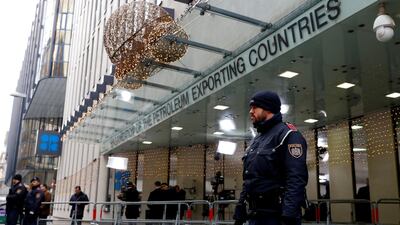Oil prices remained depressed amid reluctance from Opec+ members to agree on additional production cuts for the short term to counter the fallout from the coronavirus outbreak.
Brent, the most widely used benchmark, was down 1.2 per cent at $53.80 a barrel at 6.15pm UAE time, while West Texas Intermediate was 1 per cent lower at $49.82 a barrel.
Oil is at a 13-month low as economic activity in China, the world's largest oil importer, dramatically slowed after the spread of the epidemic, which originated in the city of Wuhan.
More than 40,000 cases have been confirmed, with the death toll rising to 908 on Monday. Land and air transportation in China has been hit and domestic travel is estimated to have declined 40 per cent year-on-year at the beginning of the extended Lunar New Year holiday period, according to JBC Energy. Swiss bank Julius Baer estimates a 20 per cent disruption to air traffic for a month will reduce Chinese demand for fuel by less than 0.2 per cent.
In order to counter the impact of the slowdown, Opec+ alliance convened an early meeting of its joint technical committee last week in Vienna. The core group of members and non-members, led by Russia and Saudi Arabia, recommended extending the pact to curb 1.7 million barrels per day until the year-end. The Opec president, Algerian Energy Minister Mohamed Arkab, said the committee also suggested deepening production cuts until the second quarter of the year. He did not specify the volume of proposed cuts, but reports said that up to 600,000 more barrels could be withdrawn.
Russia has been reluctant to endorse further cuts, with its Energy Minister Alexander Novak downplaying the impact of the coronavirus on oil demand and saying more time is needed to fully assess the impact.
Opec+ is set to meet in early March to review its pact and the recommendations outlined by the committee. Azerbaijan, a non-Opec member of the alliance, said it is unlikely that Opec would meet ahead of its planned March summit.
"If the recommendations of the JTC are adopted and carried through, we risk a return to the extremely tight physical crude picture we have only recently left behind," JBC Energy said in a note on Monday.
"There is also the issue of the relative time-lag between the immediate collapse in demand and the time taken before crude supply adjustments filter through, with crude supplied in February often not consumed until April or even May," it added.


